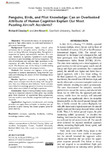JavaScript is disabled for your browser. Some features of this site may not work without it.
| dc.contributor.author | Clewley, Richard | |
| dc.contributor.author | Nixon, Jim | |
| dc.date.accessioned | 2020-10-12T14:36:24Z | |
| dc.date.available | 2020-10-12T14:36:24Z | |
| dc.date.issued | 2020-10-06 | |
| dc.identifier.citation | Clewley R, Nixon J. (2022) Penguins, birds, and pilot knowledge: can an overlooked attribute of human cognition explain our most puzzling aircraft accidents? Human Factors, Volume 64, Issue 4, June 2022, pp. 662-674 | en_UK |
| dc.identifier.issn | 0018-7208 | |
| dc.identifier.uri | https://doi.org/10.1177/0018720820960877 | |
| dc.identifier.uri | https://dspace.lib.cranfield.ac.uk/handle/1826/15875 | |
| dc.description.abstract | Objective: We extend the theory of conceptual categories to flight safety events, to understand variations in pilot event knowledge. Background: Experienced, highly trained pilots sometimes fail to recognize events, resulting in procedures not being followed, damaging safety. Recognition is supported by typical, representative members of a concept. Variations in typicality (“gradients”) could explain variations in pilot knowledge, and hence recognition. The role of simulations and everyday flight operations in the acquisition of useful, flexible concepts is poorly understood. We illustrate uses of the theory in understanding the industry-wide problem of nontypical events. Method: One hundred and eighteen airline pilots responded to scenario descriptions, rating them for typicality and indicating the source of their knowledge about each scenario. Results: Significant variations in typicality in flight safety event concepts were found, along with key gradients that may influence pilot behavior. Some concepts were linked to knowledge gained in simulator encounters, while others were linked to real flight experience. Conclusion: Explicit training of safety event concepts may be an important adjunct to what pilots may variably glean from simulator or operational flying experiences, and may result in more flexible recognition and improved response. Application: Regulators, manufacturers, and training providers can apply these principles to develop new approaches to pilot training that better prepare pilots for event diversity | en_UK |
| dc.language.iso | en | en_UK |
| dc.publisher | Sage | en_UK |
| dc.rights | Attribution-NonCommercial 4.0 International | * |
| dc.rights.uri | http://creativecommons.org/licenses/by-nc/4.0/ | * |
| dc.subject | aviation safety | en_UK |
| dc.subject | knowledge | en_UK |
| dc.subject | familiarity | en_UK |
| dc.subject | typicality | en_UK |
| dc.subject | concepts | en_UK |
| dc.title | Penguins, birds, and pilot knowledge: can an overlooked attribute of human cognition explain our most puzzling aircraft accidents? | en_UK |
| dc.type | Article | en_UK |
Files in this item
The following license files are associated with this item:
This item appears in the following Collection(s)
-
Staff publications (SATM) [4367]

